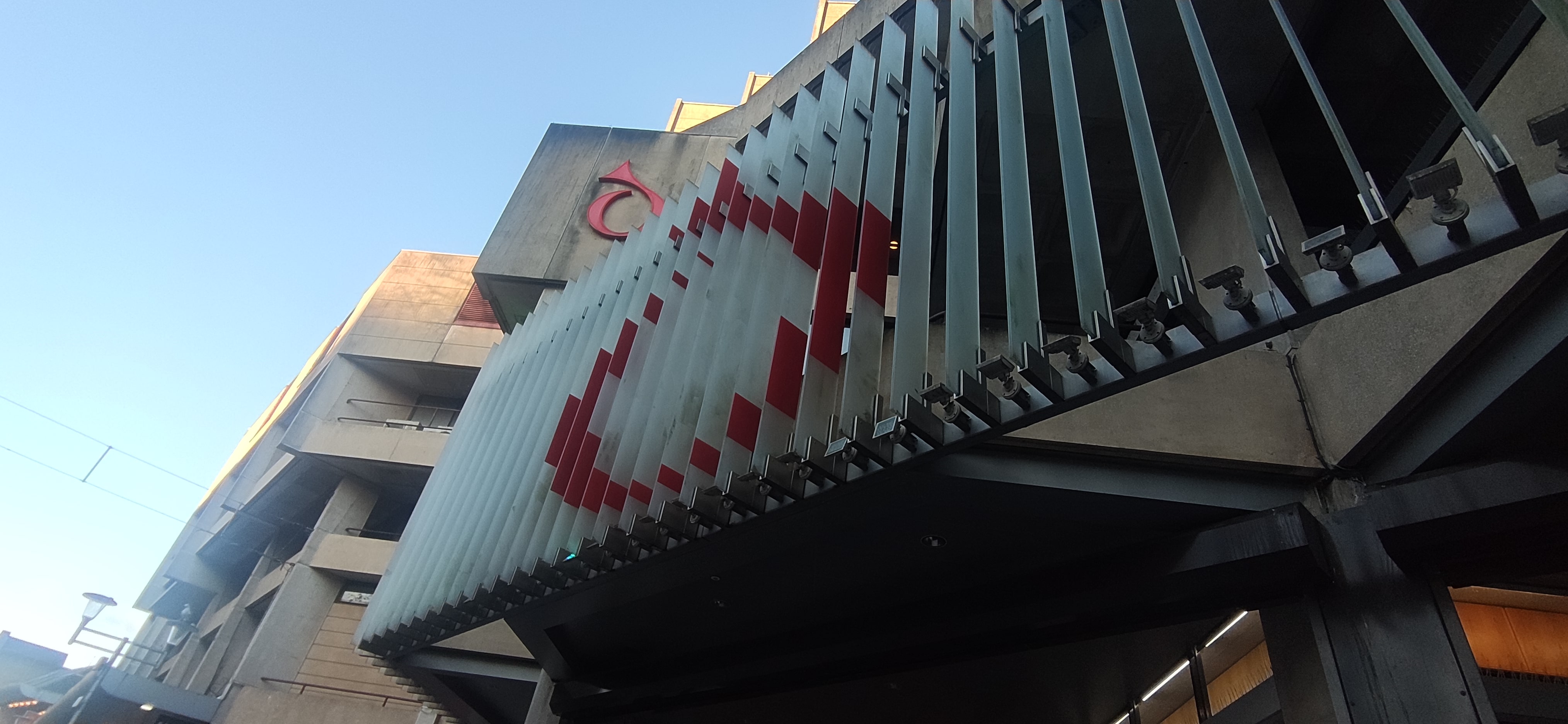
Gwenno Slams St David’s Hall Privatisation As “Selling Venue Down The River.”
As Cardiff Council rushes through plans to hand the beloved St David’s Hall over to a commercial operator, artists and performers are joining those protesting to save the venue’s future.
By Muskan Arora. Cover image by Muskan Arora
Performers and artists in Wales have rounded on Cardiff Council over its plans to allow a private firm to take over the running of St David’s Hall – one of the city’s most treasured public venues.
Acclaimed musician, singer and DJ Gwenno lambasted the move as one which sells the venue “down the river to neoliberalist thinking.”
The artist joins a growing number of people opposed to the plans, with an anti-privatisation protest being held later today (Friday 9th December) outside Cardiff City Hall.
This week, Cardiff Council strongly hinted that it plans to accept a bid from a private company to take over St. David’s Hall, despite more than 20,000 people signing a petition to stop the proposals.
Earlier this month, news about Academy Music Group (AMG) potentially taking over the venue to “safeguard” its future initially surfaced. Live Nation – who currently run the Cardiff International – are majority shareholders of AMG.
But artists fear the takeover would strip away the venue’s established role as a public space where less commercial and community artists and musicians can perform.
Taking to Facebook, the DJ and artist Gwenno wrote: “It’s the privatisation of a cultural space that will change its identity and purpose, selling the day to day running of a venue down the river to neoliberalist thinking”
Meanwhile, David John Roche, a Welsh composer now based in England also hit out at the council’s plans:
“If you’ve ever listened to any music or engaged with any arts in Wales then you need to speak up about saving this hall. Doubly so if you’re from a working-class background. Money is the major deciding factor in whether or not you can succeed as a musician, this makes it worse.”
Others joined the chorus of opposition throughout the week.
Classical music singer Elizabeth Atherton, one of Britain’s most acclaimed sopranos posted on Twitter ten questions to Cardiff Council. Atherton suggested that the kind of guarantees the council had tried to give over the safeguarding might turn out to be false promises. For example, she asked, what if after a year, AMG/Live Nation decided that the existing classical music programme was too big of a commercial risk and dropped events or the entire venue. Were other options and funding streams being explored? Would there be job cuts?
https://twitter.com/ElizAthertonSop/status/1600535458764754945 EMBED
“Will Cardiff Council also be looking to sell Cardiff Castle? Or is it just the artistic community it wishes to defund?” asked the Welsh composer Benjamin Teague, who has been a performer at St. David’s Hall.
A petition set up by arts worker Ben Harrington to stop the takeover of St. David’s Hall was quickly signed by over 20,000 people. One of those who put their name on the petition, James Watkins, highlighted how valued the venue is as a public asset.
“I used to play in the CCVG Youth Brass Bands as a kid and have fond memories of the amazing experiences I had playing at this prestigious and purpose built venue,” he said.
“I also worked there for a time as a student. The acoustics are fantastic and I’ve enjoyed so many incredible concerts there. It’s a truly special place and I’d be devastated if it got hastily sold off to live nation.”
Ahead of a ‘Save St David’s Hall – No Privatisation’ protest at 3 pm outside City Hall on Friday, Adam Johannes, Secretary, Cardiff People’s Assembly who are leading the protest, told voice.wales, “Many musicians are questioning whether the council wants to hand over day to day running of a venue well known for its support of less commercial forms of music and art, including classical, folk and roots music to an aggressively commercial private company driven by making profit from pop music.”
Cardiff council have attempted to diffuse the situation by putting forward apparent safeguards, but have also admitted that its decision is informed by continued austerity and cuts to public services.
Adam Johannes said that it was “morally wrong” that Welsh councils and the Welsh Government “have not challenged Tory austerity, but instead managed it for over a decade.”
“Councils should not act as local conduits of Tory austerity – making more and more cuts to local services, community facilities and cultural institutions – but should instead unite local government unions, community groups, the arts community, and residents to fight the UK Government for the funding our towns and cities need.”
The protests will coincide with an extraordinary meeting of Cardiff Council to discuss the future of St David’s Hall ahead of the final council decision on 15th December. Opposition councillors in the Liberal Democrats have questioned the plans, but have stopped short of opposing the idea of privatisation.
The decision to rush the move through has also attracted criticism from the Senedd Culture Committee, who have publicly asked the council why it has hastily decided to go with one particular provider, even though the council leaders told the First Minister they were working with “more than one organisation.”
“This is a fundamental question that needs to be asked of the Council,” they said.
AMG, the acquirer who owns multiple venues in the UK and actively works in partnership with O2 academies and music promoter, has agreed a long-term lease of the hall.
The firm aims to take over the venue and run it under their ‘Academy’ branding and model. AMG is 51% owned by Live Nation which already operates the Cardiff International Arena and is also the council’s preferred business partner for the planned new Cardiff Bay Arena.
Management at St David’s Hall itself have also questioned the “speed at which this momentous decision is taking place and lack of consultation or information.”
Protesters standing against the privatisation of the Hall say the council should consider all alternative avenues to secure the funding necessary to maintain the building and clear the current maintenance backlog – including asking the Welsh Government to provide financial assistance to secure its future.
Another concern raised has been for the Hall’s workforce, who are currently employed by the council. Under the proposals, they would move employment to AMG / Live Nation.
Their trade union, UNISON, released a statement on Thursday joining opposition voices:
“In ongoing meetings with Cardiff Council, Unison has questioned and challenged many aspects of the privatisation of St David’s Hall. We have sent a clear message to Cardiff Council that we oppose any proposal that threatens our members’ terms and conditions. We firmly believe that St David’s Hall would best serve citizens of Cardiff by remaining in control of the local authority.”
The council has said that all existing staff would be transferred under TUPE legislation, meaning that current terms and conditions and pay would be protected. But new workers would be employed under likely worse conditions and less pay, and existing staff would not be guaranteed future pay rises afforded to local government workers.
Past experience of the privatisation of performance venues in Cardiff also paints a worrying picture of what awaits staff.
“We have seen in previous council privatisation and outsourcing of local services and community facilities, whatever initial guarantees are given to the council by private companies, the workforce invariably end up with a worse deal. Both New Theatre and local leisure centres have seen job cuts and the public getting a worse deal too,” said Adam Johannes.
As numerous pieces of information are kept private from the public and plans are rushed through, protests and growing opposition seem like the only way to stop St David’s Hall being taken over in the name of profit.


1 Comment
Comments are closed.